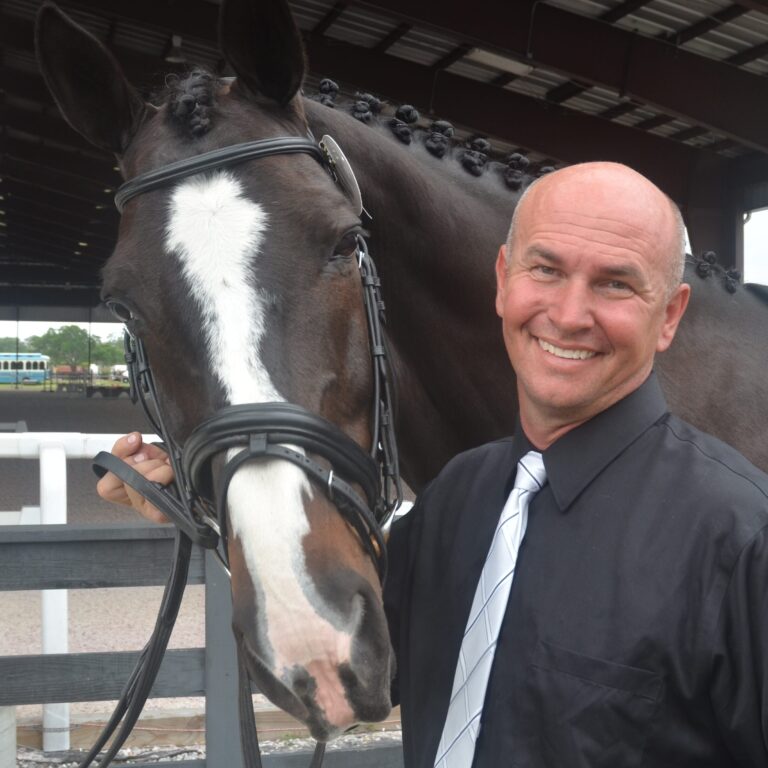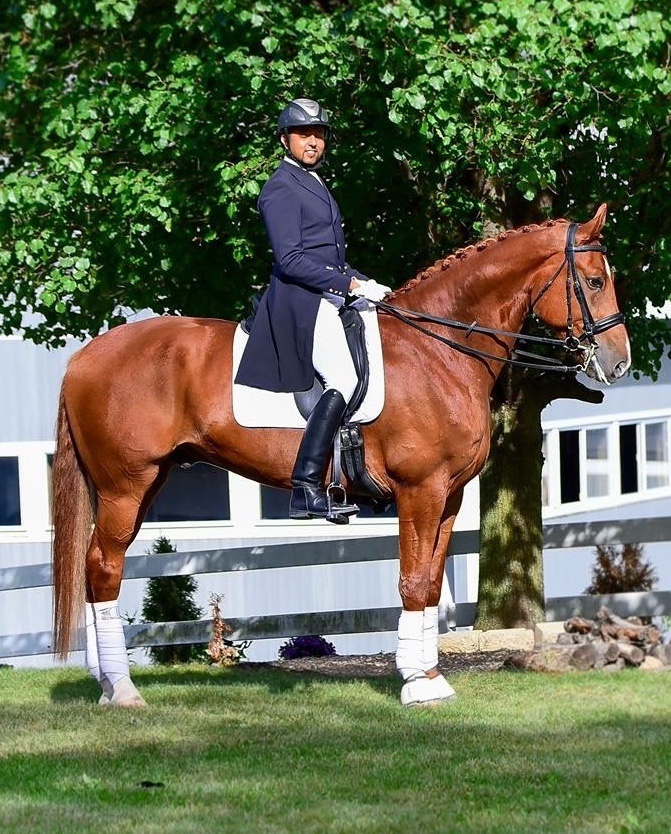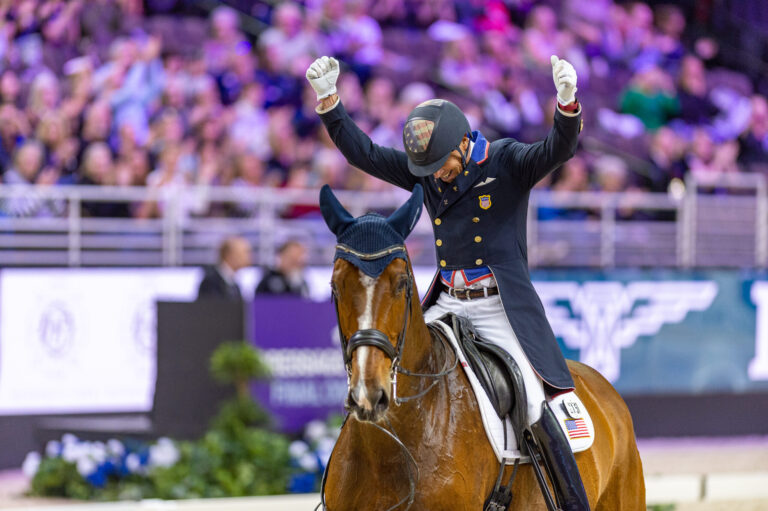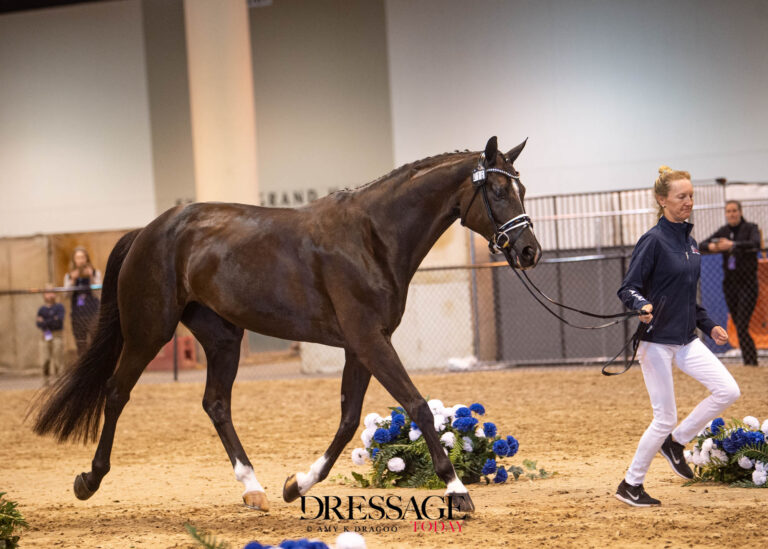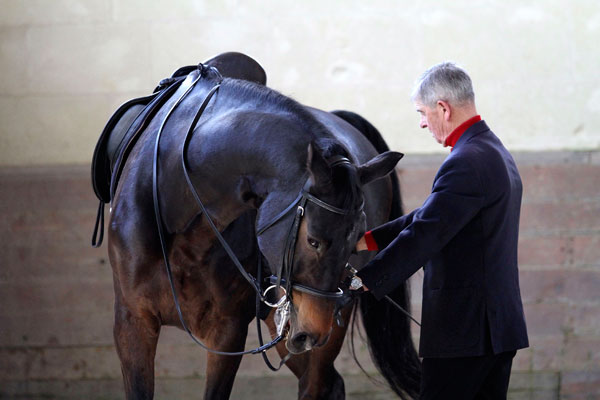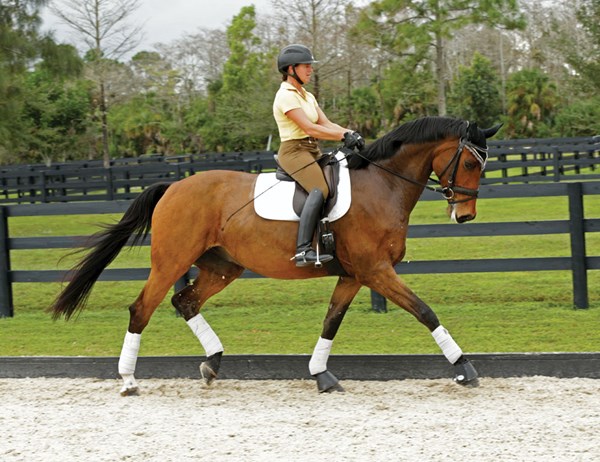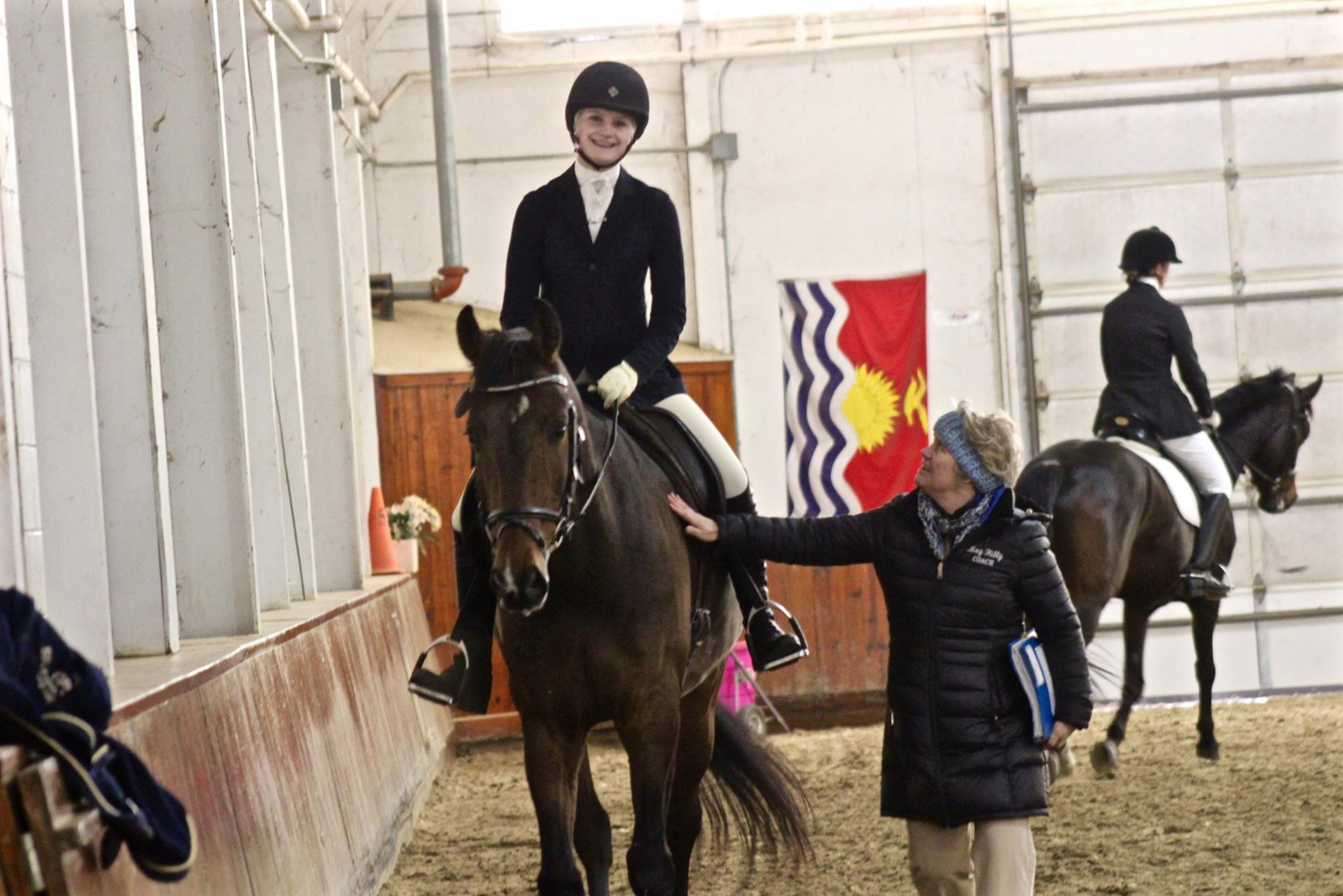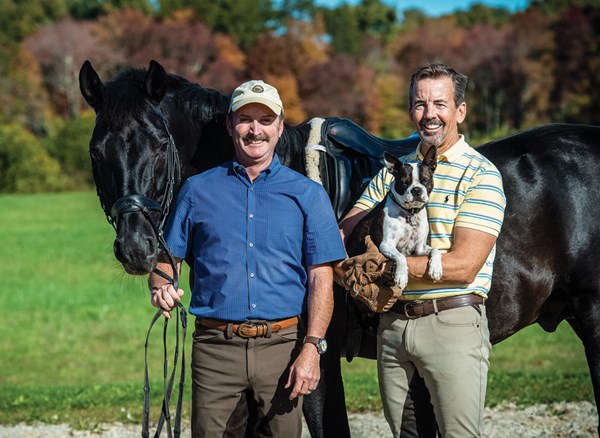
A simple walk down the barn aisle on a weekday morning at Dry Water Farm in Stoughton, Massachusetts, gave me an immediate sense of the atmosphere at Warren-McMullin Dressage. From the sound of cheerful conversation of riders tacking up in the cross ties to the sight of horses happily hacking out in the fields, you can’t help but be energized by the upbeat flow of activity.
Fizzy, a 6-year-old Boston Terrier and the unofficial mascot of the operation, was the first friendly face to greet me. Several well-muscled horses waiting for their hay in their stalls looked hopefully at me with their ears pricked forward as I walked by. Farther down the barn aisle, past the tack room and wash stall, I spotted a wall covered in framed photos. My eyes were drawn to an image of the two men behind the operation, Bill Warren and Bill McMullin. Dressed in top hat and tails, Warren held a striking bay horse in a double bridle standing next to McMullin, who smiled brightly while holding Fizzy in his arms. The second photo that I noticed, however, was one that looked more like something out of a family photo album than an image of barn mates. In the picture, “The Bills,” as they are fondly known, gather with 13 women around a table spread with flowers and food. The photo is appropriately captioned “The Warren-McMullin Dressage Family, 2012.” Next to the photos was a dry-erase board, where, on the day that I was visiting, the actual Warren and McMullin stood planning out their schedule.
About Warren-McMullin Dressage
What might appear to someone else as a very full day is considered a “relatively easy” day for The Bills. Based just 20 miles south of Boston in the spring, summer and fall months, the gentlemen combine a unique attitude with their world-class training program. While they have a special focus on bringing horses to the FEI level, they also offer top-quality instruction to dressage students of all levels and work with horses of all breeds.
The success of their program speaks for itself, as they have developed quite a loyal following—not just of top-notch professionals, but also of passionate Adult Amateur riders. The sense of camaraderie in this place is palpable, and it comes as no surprise that when Warren and McMullin depart to spend their winter months in Florida, there is a mass migration of their client base as well. Even more intriguing is the fact that it’s not just the professional riders who make the journey to Florida—the Adult Amateurs find their home away from home there, too.
Adult Amateur Ginny Commander has been a client for more than 20 years, and attributes The Bills’ popularity to an unconditional dedication to students and a respect for each of the horses they work with. “They give 150 percent of themselves to every single student and every single horse,” she said. “They’ve been that way for the 20-plus years I have known them. Their work ethic and integrity are extraordinary.” Commander is the owner of a 9-year-old Hanoverian mare named Ratzberna, or “Ratzi,” who is currently in training with Warren and ranked No. 4 in the country for Third Level horses.
Between Warren and McMullin, there’s certainly no shortage of talent or experience. Warren is an FEI 3* judge, USEF ‘S’ judge and a USDF gold medalist and has worked extensively with dressage greats such as George Williams and Conrad Schumacher, who both helped him progress with his Grand Prix partner, Romantic. McMullin is a USDF silver medalist, USDF Certified Instructor, as well as a USDF faculty member at Training through First Level. He is also a USEF ‘r’ judge, maintains an active clinic schedule and has recently completed the ‘R’ judges’ training program.
With only nine lessons, it was a relatively calm day out at Dry Water Farm. According to The Bills, their easy days tend to include around 10 sessions, but other days, they can have several trailer-in lessons as well. “The scheduling of things is the biggest challenge on a daily basis,” McMullin said, as both of their weeks are filled with lessons, training rides, giving clinics and judging or coaching at shows. “The good thing, though, is that our clients are rarely left without at least one Bill around,” Warren added with a laugh.
During their winter months in Florida, the activity doesn’t slow down, either. “It’s busier for us in the sense that it is more concentrated. When we are in Florida, we travel less, so we tend to take on more teaching,” Warren said. Their barn in Florida has 16 stalls, which are always full, and more clients typically hack over for lessons from other barns.
“I’ll be anxious to get to Florida, but I love working here at this time of year [autumn], with the trees amazing colors and the view of the fields,” Warren said, motioning toward the open barn door, which offered a view of the glowing orange and red tree line.
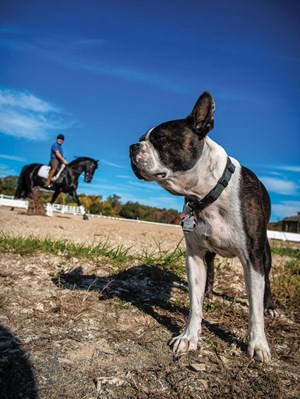
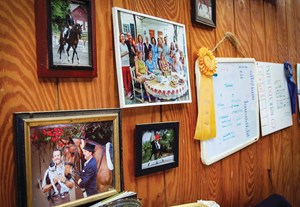
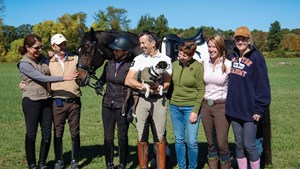
A Skill for Matchmaking
First up on the schedule that day was Adult Amateur Kim Quinlivan, who travels about 45 minutes from her home in Medway, Massachusetts, to ride her 8-year-old Hanoverian mare, named Lilly, whom she purchased as a 5 year old. With the help of The Bills, Quinlivan manages to fit riding into her busy schedule, which also includes taking care of her two sets of twins and working in the field of international tax.
“When I first started riding, I was very timid,” Quinlivan said. “But they encourage me to do a little bit better each day. I leave every day thinking, I am so happy and so glad to be doing this.”
While a 5-year-old mare might seem like an unlikely partner for a timid rider, it seems as though the steady-minded Lilly just might be the exception. As she is still relatively inexperienced, McMullin rides her regularly to ensure that her own training continues to progress.
As we watched McMullin warm her up and stretch her before Quinlivan began her lesson, Warren said they had found her one year in Florida, the day before they were leaving to head back up north for the spring. When they tried her, they discovered that she was exceptionally levelheaded and safe and called Quinlivan to tell her they thought she would be a good match. Without even seeing the horse for herself, she put her trust in The Bills’ judgment and gave them the go-ahead to bring her home.
As Warren told me the story, I watched Lilly quietly focus on stretching into a long rein as construction vehicles in the background loudly maneuvered large piles of rocks. She seemed completely unphased. She didn’t bat an eye either when Fizzy excitedly sprinted by her in a corner of the ring. “She’s just a great all-around horse,” Warren said. There’s no buyer’s remorse on Quinlivan‘s end either—“Lilly is exactly what they said she was,” she added.
Finding the horse who is the perfect fit for their clients is one of the keys to success in The Bills’ training program. “We try to match horses and riders who we know can ride here without us and stay safe,” Warren said. “Everyone should be safe no matter what. If you can’t feel safe, you aren’t going to be able to enjoy your horse either.”
During Quinlivan‘s lesson, McMullin coached her to think about straightness and forward energy. “Getting [Lilly] moving forward is what gives her confidence in the ring,” he called to Quinlivan. “The more forward she goes into the reins, the less little hiccups you’ll have.”
After Quinlivan’s lesson, she told me more about why she loves Warren-McMullin Dressage. “These guys are beyond five star,” she said. “Everything they do is with integrity and professionalism. I don’t think I could do it without these guys. I’ve been with them since 2006. They are 100 percent engaged in what they’re doing and committed to the horses and students.”
Beyond the Show Ring
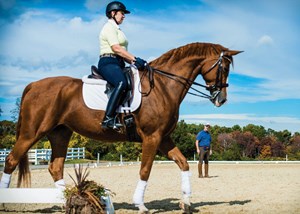
As the day progressed with various lessons, training sessions and a long-line session, I got a first hand look at the unique attitude that Warren and McMullin both share. When I first walked into this barn full of talented horses and committed riders, I mistakenly assumed that the focus was on competitive success—but I was quick to learn that the team’s success at shows is only the result of achieving much broader goals.
“Everybody rides for different reasons,” Warren said. “Not everybody rides to compete. In the group we have, everybody wants to progress, but in their own time. If they don’t even want to compete, we don’t see that as a negative. We take them just as seriously as someone with that competitive edge.”
The same mindset holds true for the way that Warren and McMullin progress the horses in their training. “That’s what I love about working with Bill [Warren],” Commander said to me after we watched him school her chestnut mare. “He takes the time to work the horses correctly and works them as far as their comfort zone allows. They are extremely respectful of the horse. They never let competitive goals take over the best interest of the horse. The competitive success seems to come anyway in that process. Of course, the horses have to have a certain amount of ability, but they get the best out of whichever horse they ride.”
While Warren and McMullin both have an eye for selecting quality horses, that doesn’t dampen their eagerness to work with horses of all shapes, sizes and ability levels. Just in their barn alone, you’ll find Warmbloods, a Friesian, a Lusitano and a Morgan. “Everybody loves their horse,” Warren said. “We wouldn’t turn someone away because they have a certain breed. We’re not breed prejudice. Because we work with such a wide variety, it keeps us happy. It keeps us interested and always finding new ways to keep horses and riders progressing.” When it comes to their approach to training, their strategy is determined more by the horse’s conformation and temperament than his or her breed.
Later on in the day, I got to see Warren’s and McMullin’s creative teaching techniques in action. Carol Sahlman and her horse, Darby, an 8-year-old Hanoverian, began their lesson with Warren working over poles. “Push your hands to his face without sliding your reins longer,” Warren said as he helped Sahlman find improved connection in the bridle. Later, Leslie Cokin and her horse, Rohanna, a 12-year-old Hanoverian, joined the lesson, and the two horse- and-rider pairs headed into the dressage ring to do group work.
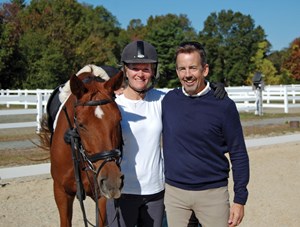
After both horses and riders were adequately warmed up, Warren had one pair follow directly behind the other to practice finding and maintaining a clear, steady rhythm. “It gives them a feel for riding an absolute steady tempo,” he said. “Individually, a rider doesn’t realize how often her horse’s speed changes. It also becomes relaxing for the horse and the rider. It helps them get rid of their tension and anxiety. When you have a good leader who can pave the way, it allows the one following to focus on other things.”
Following the group work, Warren sent Sahlman and Cokin out into the field to take their horses for a walk. For Warren, teaching a horse and rider to perform in the ring is only one part of his goal. “Building a rider really goes beyond the sandbox. We want our riders to be able to enjoy their horses. Making a rider is a lot more involved than just taking someone through a fancy movement,” he explained to me. When Sahlman and Cokin returned from their hack, Warren looked at them and smiled. “You both made my day,” he said.
Teaching the Adult Amateur
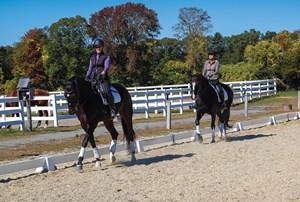
As Adult Amateur Marsha Fahey and her 12-year-old Lusitano, Xanur, warmed up for their lesson, Warren shared more of his thoughts on guiding Adult Amateurs through their dressage journeys. “Marsha is a very dedicated rider,” he said. “She works hard and is a thinking rider. She sometimes shows, but she’s not show- crazy. She works hard at improving herself as well as improving her horse.” As Fahey and Xanur approached the end of the ring where we were talking, she added that she’s not afraid to show but enjoys learning above all else. “I enjoy my lessons more than I enjoy showing,” she said earnestly.
Fahey often makes the trip down to Florida, where many of the Warren-McMullin dressage students watch each others’ lessons. But Fahey takes things to another level by attending additional educational events, such as clinics and symposiums as well. “I think it’s important for people to see other things beyond what they’re doing, themselves,” Warren said.
When it comes to teaching both professionals and Adult Amateurs, Warren and McMullin are focused on perfecting rider position. “We’re both very strict about rider position,” Warren said. “The horse can’t function properly if the rider can’t sit and function properly. I think we’re strict about the basics because without them, the horse doesn’t have a chance.”
So, is their approach to teaching amateurs any different from their approach to teaching professionals? “Yes and no,” Warren said. “It is not necessarily different in regard to teaching different techniques, but I might challenge the professional a little quicker. Sometimes the Adult Amateur’s body needs more time to get where we need it to be. For the professional, I might challenge them a little faster and be more demanding. We’ve been doing this our whole lives so we sometimes forget that not everyone’s body reacts as quickly as someone who has been doing this since they were a kid. We also try to find a creative way to challenge our students without making them feel overfaced.”
According to McMullin, there is also a trick to helping riders feel supported while still giving them the opportunity to learn independently. “Riders need some time to digest things themselves. We don’t want to hold their hand every step of the way, but finding that balance is a challenge.”
Friends Who Became Family
A balanced approach to training isn’t the only factor in the success of Warren-McMullin Dressage, as The Bills are quick to credit their clients with helping to maintain the happy atmosphere in the midst of a jam-packed schedule. “We are fortunate to have a compatible group of people,” Warren said.
Listening to the women talk, it’s obvious that they’re all in the journey together for the long run and the support of the community is really what makes it all worthwhile. “We go out to dinner a lot and we take turns cooking dinner,” Commander said. “We’ve gone out to the theater together. We’ve become good friends. We’ve kind of become our own little family.”
Adult Amateur Heidi Zazza, of Hingham, Massachusetts, has been with Warren-McMullin Dressage for about a year and a half and is a relative newcomer to the group. “Everyone was very welcoming,” she said. “It kind of felt like I was breaking into someone’s family because they’ve all known each other for 15 to 20 years. It’s been a fantastic experience. I think it’s because of The Bills—their personalities foster that. The people who want to train with them are down to earth because they themselves are down to earth.” Zazza said that her mare has progressed tremendously in their training program and she also traveled with the group to Florida last year to participate in their training boot camp.
“We enjoy the camaraderie of the group,” Commander said. “We enjoy watching each other grow and the horses progress. The joy is not just in our own horses and riding… it’s in supporting each other.”
Making a Trip to Florida Possible
For some riders, the experience of winter training and showing in Florida is just another piece of their annual dressage calendar. For others, it’s a pipe dream and a far cry from becoming a reality. Although the journey to Florida can be expensive, many argue that a trip down south can be worthwhile due to the high concentration of learning and showing opportunities available within one area.
For Bill Warren and Bill McMullin and many other dressage professionals, heading to Florida is a logical business decision. But they’re not the only ones who get to enjoy the sunshine and warmer weather, as many of their Adult Amateur clients make the trip as well.
According to Warren, there are a variety of ways to make the journey possible. “There are different levels of involvement with the Florida experience,” he said. “Some ladies own property and spend the entire winter there. Others save up and rent a room for a shorter period of time.”
Some people who cannot afford full board for themselves find less- expensive farms to board at and hack over to other locations for lessons. Others arrange for self-care board. “There’s a whole range of ways you can manage,” Warren said.
McMullin said that riding in Florida during the winter provides a more concentrated period of time in a warmer climate and greater exposure to high-quality competition. “There’s more to see without having to travel,” he said.
Not every member of the Warren-McMullin dressage family is necessarily even interested in showing in Florida. Instead, they simply like to take advantage of the increased educational opportunities. Watching lessons, auditing clinics or symposiums or cheering on their friends at shows are worthwhile experiences in and of themselves. For the Adult Amateur, a trip to Florida also has the unique benefit of providing a place where he or she can focus on riding without the distractions of everyday life back home.
For Warren and McMullin, every day is different in Florida. “But we’re lucky to be in both places,” McMullin said.
An Adult Amateur’s View
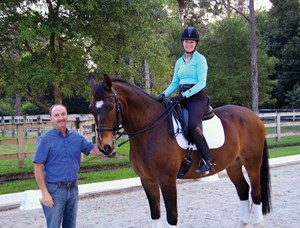
By Debra Reinhardt
The Adult Amateur lifestyle in Florida can be scary and costly, but more than anything else, it is fun! For me, it has been difficult to combine my job, family and my beloved sport of dressage, but I know I am preaching to the choir–— my fellow Adult Amateurs. I live full-time in Southbury, Connecticut, and train with Vicki Hammers-O’Neil during the majority of the year and I train with Bill Warren in the winter in Florida. In 2014, Bill told me that if I came south, he would be happy to teach me. I knew he was very busy with his own clients and, at the time, I couldn’t see how he would have time for me. However, he did make time by teaching at 7:30 in the morning—and it will be the same this year. The other reason I wanted to train with Bill is that he teaches a lot of Adult Amateurs and he knows we may not always be the bravest. Even more important is that he has many Adult Amateur clients who are competing at FEI level, which attracted me since I had a Grand Prix schoolmaster. I think their training program is very much tailored to the horse and rider in terms of what the horse is capable of doing and what the rider is capable of asking. Bill knows when to push me and how to find the right exercise to help me get to the best result.
So how did I make it happen? For my first trip to Florida, I started my planning early in the spring and researched all possible avenues. I found it was helpful to be in Florida for one season to network before I brought a horse with me. The keyword is network. Balancing this journey with family life is another big concern for many people in my position. When my son graduated from high school and was going to college, it opened up the opportunity and helped a lot with the family obligation. Yes, my husband would be upset that I would not be at home, but his job allowed him to do it from virtually any location, so he was able to come for visits.
As for the cost, which is high, you need to be prepared to spend at least 50 percent to 100 percent more for board. The first year I was in Florida with a horse, I sort of had a scholarship in that the owner of the horse I was leasing gave me the opportunity to join her barn in Wellington. I did have to do chores and take care of my horse and by doing so I had a much-reduced board.
However, this second year, as I am going again with my horse, I shopped around for a place. I made many contacts while I was down there last year and I researched prices for dry stalls to full board. I am very pleased that my first choice was available. I will be going to Longview Farm South, across the street from White Fences.
Housing is also a concern, but luckily, there are options. You can rent a house/condo, share a rental or rent just a room. You can use a realtor, but then your rent will include a commission. In my opinion, networking is the best way to find out what is available. I will be renting a house about three miles from the barn for the season and my husband will be joining me.


